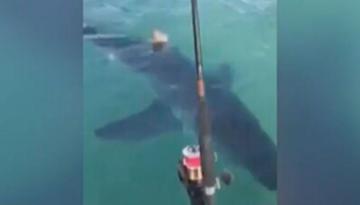Shark experts and experienced fishers say something's going on around our coastline to attract more sharks.
There have been sightings of the apex predators close to shore all summer.
One theory is that there are more fish around and that means more sharks.
And a lot of those sharks are being caught accidentally, which is exactly what happened to two experienced fishers who hooked a great white on Thursday.
O'Hearn and Radonich caught the shark 200 metres from Matakana Island near Waihi and battled it to shore to remove the hook.
Radonich said his Shark experts and experienced fishers say something's going on around our coastline to attract more sharks.
There have been sightings of the apex predators close to shore all summer.
One theory is that there are more fish around and that means more sharks.
And a lot of those sharks are being caught accidentally, which is exactly what happened to two experienced fishers who hooked a great white yesterday.eart was in his mouth.
"Nathan told me off a bit - he was like, 'be careful, be careful'. I've never been close and personal."
At 150-200kg, the great white had the potential to cause some serious damage while the fishing show presenters started filming their advice about barbless hooks.
"We wanted to make a video around education, about how to catch sharks the best way - and when I say the best way I mean the best way for the fish," O'Hearn said.
Radonich said he'd always wanted to catch a shark.
"But then they became illegal to catch, so we never targeted them. [We were] up here fishing for bronzies and had one in the harbour take the bait."
The pair were just 3km from the boat ramp when they landed the shark on Matakana Island. Just around the nearby headland is the Bowentown end of Waihi, where Kaelah Marlow was killed by a shark in January.
A week ago, another fisherman reeled in a great white at the same spot.
Local fishers have a theory: that an abundance of other fish this summer has been attracting the great whites.
"Something special is going on because when you see an endangered animal in an area like that, that reflects a healthy ecosystem," said shark expert Dr Riley Elliot.
After seeing many videos of sharks caught this summer, Dr Elliot warns the animals need to be put back in the water as soon as possible and reported to the Department of Conservation.
"There haven't been studies looking at post-release mortality," he said.
"If you're going out trying to catch a shark, and you catch one of them and because of that it dies, well question whether you should be shark fishing or not, you know?"
On this occasion, the shark was calm even though it had been pulled to shore.
"It was sitting there, breathing and eyeballing me a little bit, but it never really did anything other than just sit there 'til we just pushed it back and let it go," said Radonich.
After a moment of disorientation the shark did eventually swim away, but the best scenario for all - sharks and fishers - is to avoid catching them at all.





